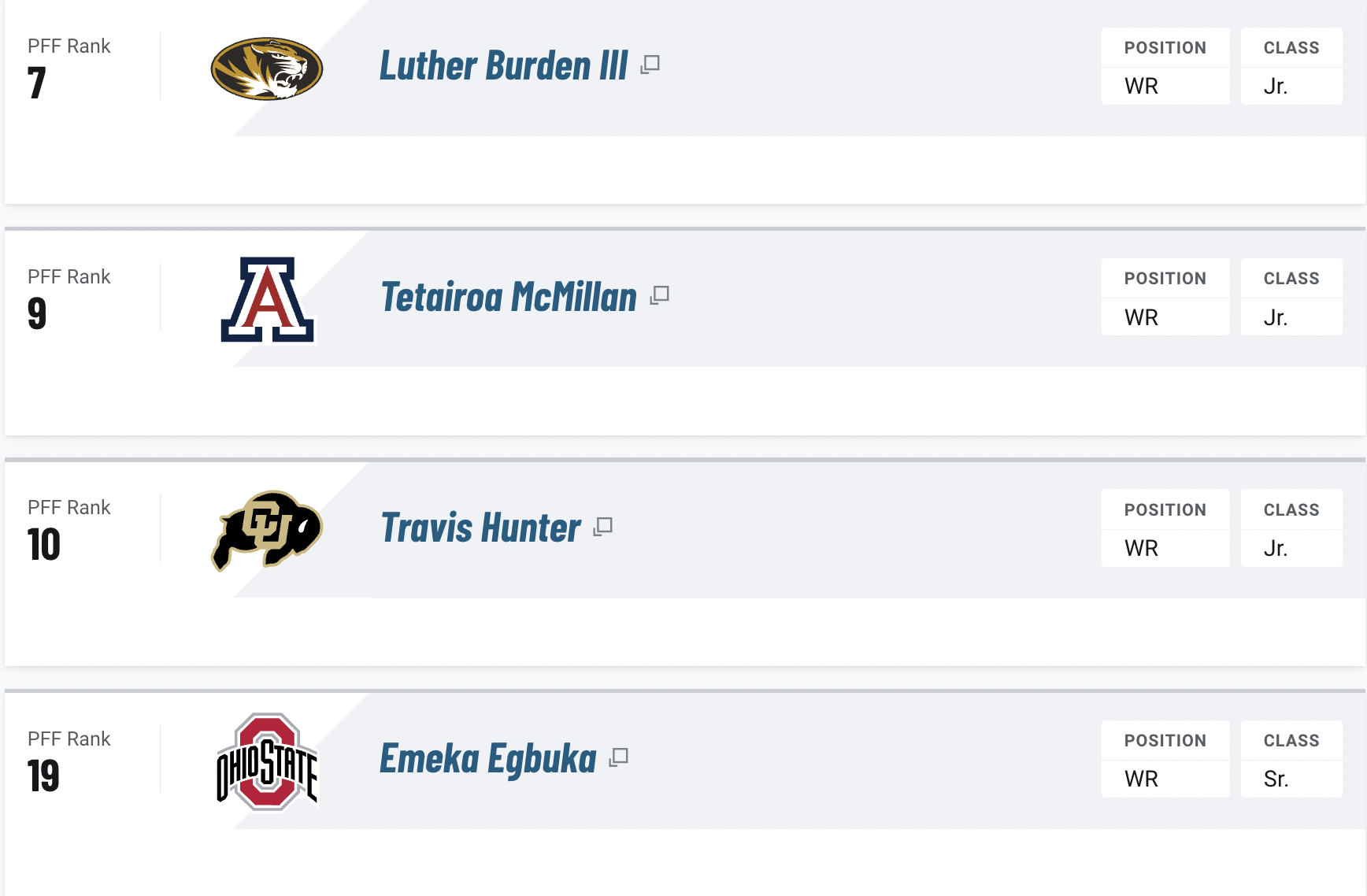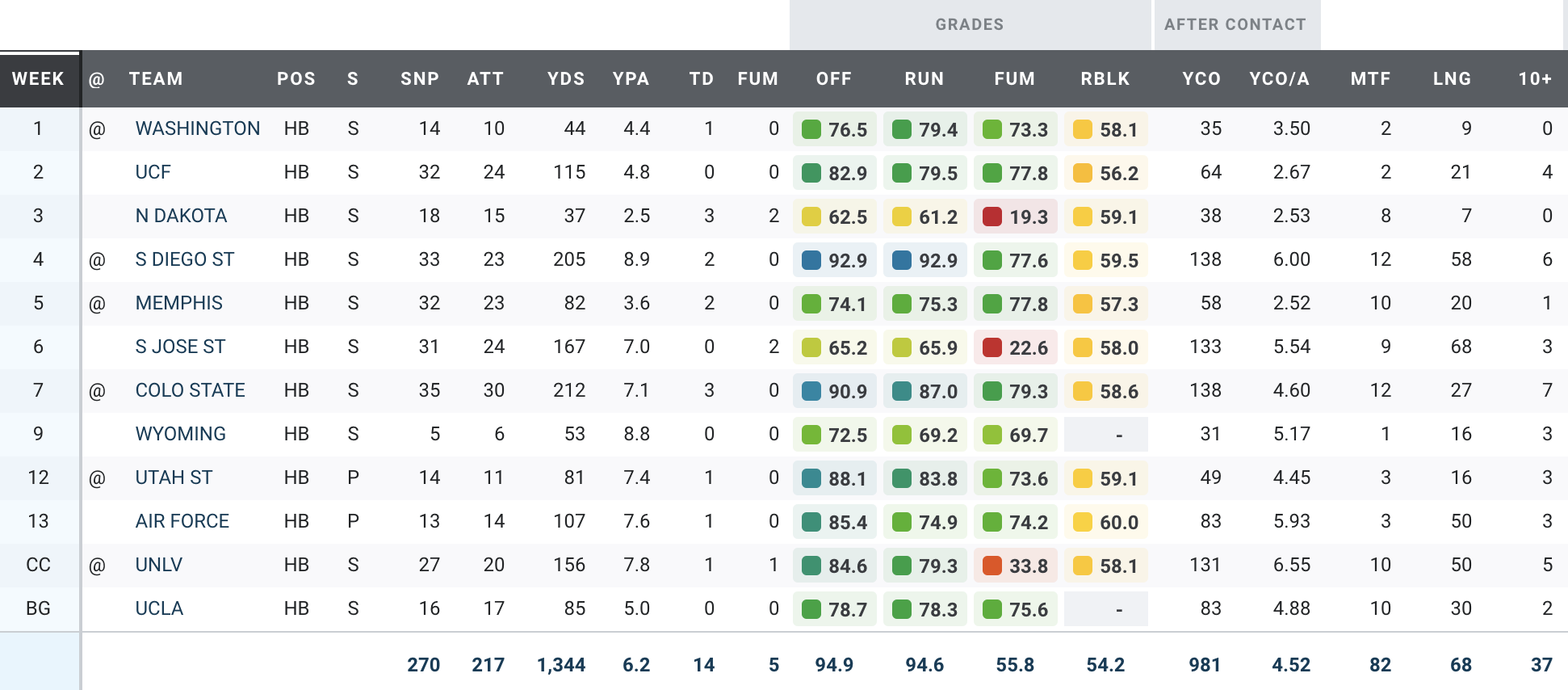


• The SEC has another future first-round receiver in Luther Burden III: Burden is an all-around playmaker who stresses coverages in several ways while separating at an elite rate.
• Tetairoa McMillan is the name to know in the new-look Big 12: Though he lacks some separating ability as a big receiver, he hauled in 18 contested catches in 2023, and some were jaw-dropping. He will bring WR1 potential to the pro level.
• Get a head start on fantasy football: Use PFF’s fantasy football mock draft simulator to create real live mock draft simulations to prepare for your live draft!
Estimated Reading Time: 5 minutes
We have already scouted a ton of players in preparation for the 2025 NFL Draft, and to help shout out the best of the best, we’ll be examining the top offensive prospect from each Power Five and Group of Five conference.
Luther Burden III trailed only LSU’s Malik Nabers in 2023 when it came to boasting the highest receiving grade in the SEC.
At 5-foot-11 and 210 pounds, Burden is an all-around playmaker who stresses coverages both with and without the ball. His overall separation percentage (85.0%) placed him in the 90th percentile, and his separation percentage against single coverage (62.8%) ranked in the 64th percentile
He’s an NFL star in the making.
The Big Ten is home to many top 2025 NFL Draft prospects, especially when you throw Oregon’s returning players into the conference (Tez Johnson, Jordan James, Josh Conerly Jr., Terrance Ferguson, Ajani Cornelius, etc.).
But, ultimately, this decision came down to two players: running back Quinshon Judkins, who played the previous two seasons at Ole Miss and is now with the Buckeyes, and Michigan tight end Colston Loveland.
Judkins can be the top prospect in a stacked running back class. His blend of speed, power and balance have yielded back-to-back 1,000-yard seasons. From 2022 to 2023, his yards after contact average ranked in the 49th percentile and his forced missed tackles figure placed him in the 88th percentile.
Loveland is also a stud, but we can only choose one.
The 6-foot-5, 210-pound McMillan made some of the best plays of any receiver in college football last season. His 87.4 PFF overall grade and 89.1 receiving grade were both the highest marks at the position in the new-look Big 12. Though he lacks some separating ability as a big receiver, he hauled in 18 contested catches in 2023, and some were jaw-dropping. He will bring WR1 potential to the pro level.
Texas Tech running back Tahj Brooks made this a discussion, thanks to his 92.1 PFF rushing grade in 2023. But when it comes to seeing these players through an NFL draft lens, McMillan had to be the choice.

There wasn’t much to choose from in the Pac-12 because, well, just Oregon State and Washington State remain after this offseason’s realignment.
Even then, we would have had an obvious pick in Oregon State running back Damien Martinez, but he is now with the Miami Hurricanes. We could have had another easy choice in quarterback Cam Ward, but, ironically enough, he is also with the Hurricanes.
Beavers left tackle Joshua Gray is next in line. He finished 2023 with a 69.2 PFF overall grade and will take over the spotlight in Corvallis after a stellar season from Taliese Fuaga on the right side of the line last season. Gray has been starting at left tackle since 2020 as a redshirt freshman.
Hampton was a stud as an underclassman in 2023, recording more than 1,500 rushing yards and 15 rushing touchdowns. The 6-foot, 220-pound sophomore ranked second in the conference in total snaps played (670) and second in PFF rushing grade (90.6). His blend of power and speed makes him a top-tier prospect, one who could be in first-round conversations next offseason.
With quarterback Drake Maye off to the NFL, expect another big workload for Hampton in 2024.
Williams has been on a bit of a college football journey. He started his career at Oklahoma before following head coach Lincoln Riley to USC. His production and volume improved in 2022 but dipped back down in 2023. He is now set to star for Tulane in 2024.
Williams earned a 79.2 PFF receiving grade as a freshman, and over the last two seasons, the 5-foot-9, 175-pound receiver has been one of the top separation creators in the FBS. He will likely be the focal point of Tulane’s passing attack.
Jacksonville State guard Clay Webb recorded the highest PFF overall grade (87.5) of any Conference-USA offensive lineman last season. His 89.0 pass-blocking grade ranked third, and his 85.1 run-blocking grade placed at the top.
Webb was a four-star recruit who started his career at Georgia but transferred to Jacksonville State in 2022 after seeing limited playing time in three seasons with the Bulldogs.
Stewart led the MAC in PFF overall grade in 2023 (95.6), largely thanks to a 94.2 rushing grade. He recorded just 127 rushing snaps last season, missing the final four games due to a leg injury. But before that, he recorded a missed tackles forced average of 0.62, one of the highest marks in the PFF College era, and a 5.0 yards after contact average. Those numbers ranked in the 100th and 97th percentiles, respectively.
Stewart is listed as a junior but has been at Bowling Green since 2019. If last year was any indication, he could be in for a huge 2024 season.
The Mountain West Conference has some fun 2025 NFL draft prospects. Wide receivers Ricky White and Tory Horton will be fan favorites for their top-tier production.
But it feels like no one in the conference can come close to Boise State running back Ashton Jeanty, who ranked second among all college football running backs in 2023 in PFF rushing grade (94.6).

The Sun Belt gave the 2024 NFL Draft two excellent running back prospects in Frank Gore Jr. and Kimani Vidal. The conference might have another back along those lines in Jalen White from Georgia Southern.
White ranked seventh in the conference last season with an 85.6 PFF rushing grade. At 6-foot and 220 pounds, he will bring ideal size to the position in the NFL. He finished 2023 with 34 runs of 10-plus yards and has finished the past three seasons with a max speed above 20.0 miles per hour.